高中英语北师大版必修第三册Unit 9 Learning Lesson 3 The Secrets of Your Memory 课件(25张ppt)
文档属性
| 名称 | 高中英语北师大版必修第三册Unit 9 Learning Lesson 3 The Secrets of Your Memory 课件(25张ppt) |
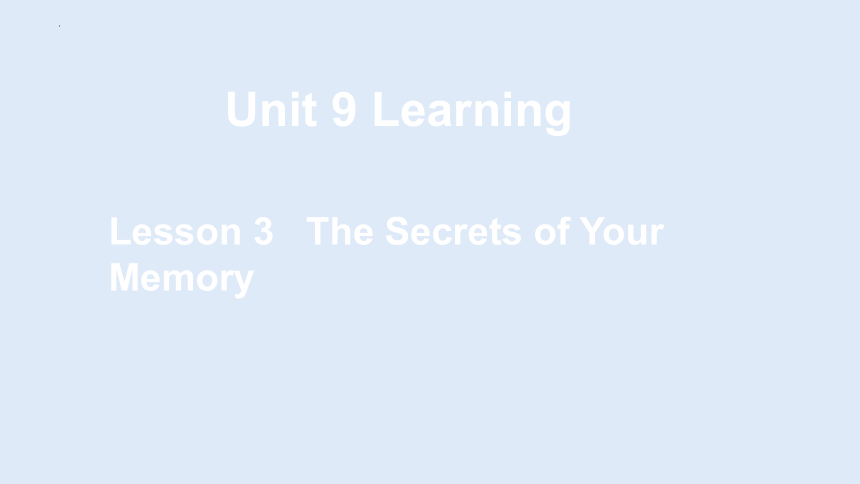
|
|
| 格式 | zip | ||
| 文件大小 | 1.1MB | ||
| 资源类型 | 教案 | ||
| 版本资源 | 北师大版(2019) | ||
| 科目 | 英语 | ||
| 更新时间 | 2022-07-02 18:30:01 | ||
图片预览

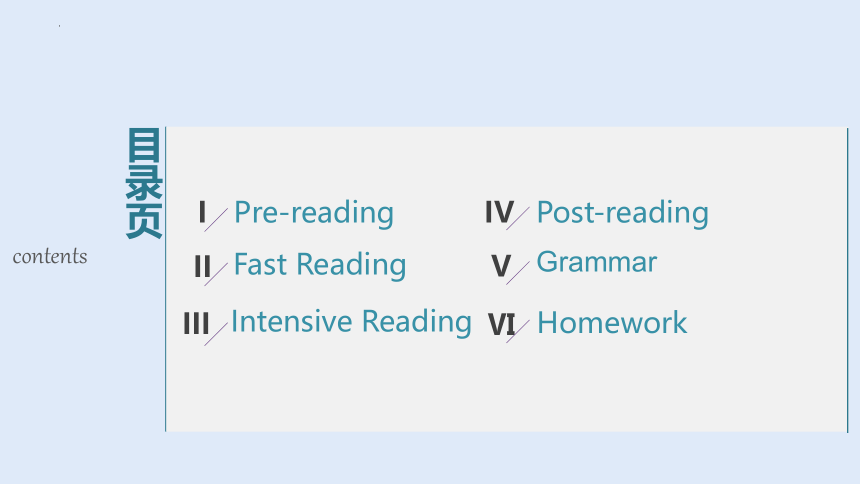
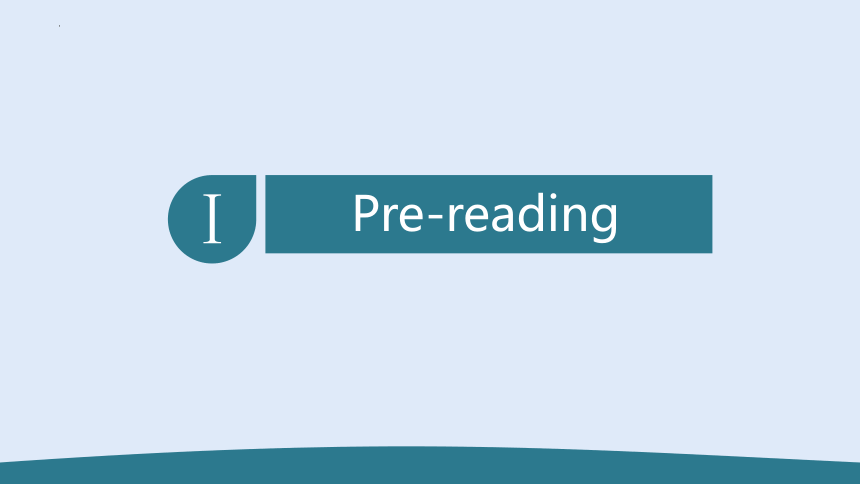
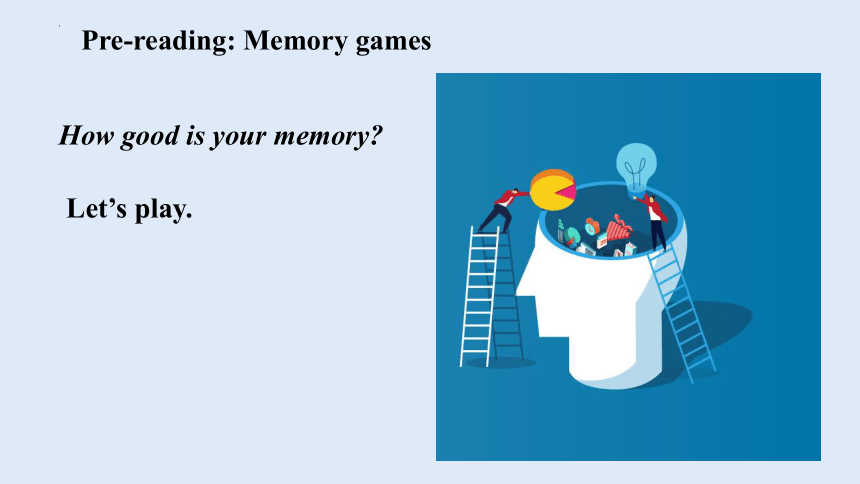
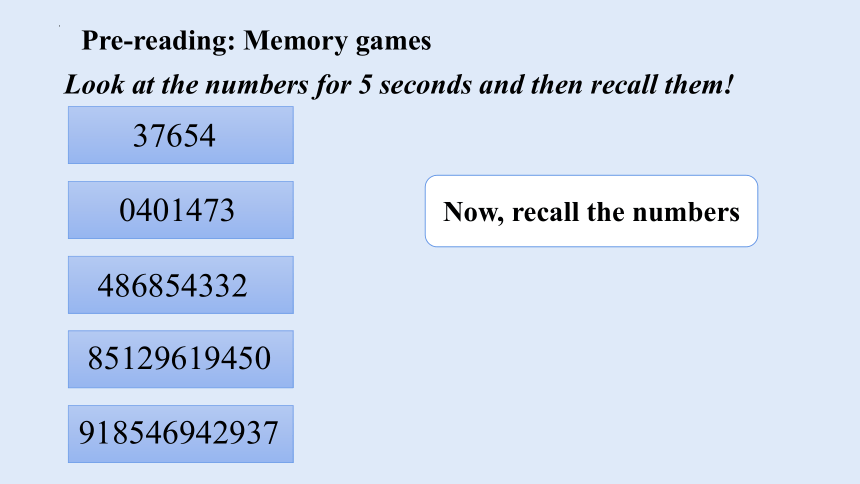
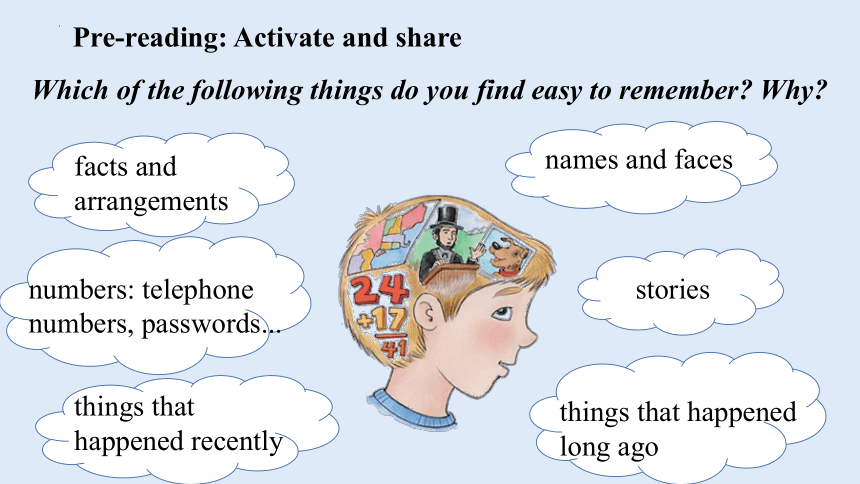


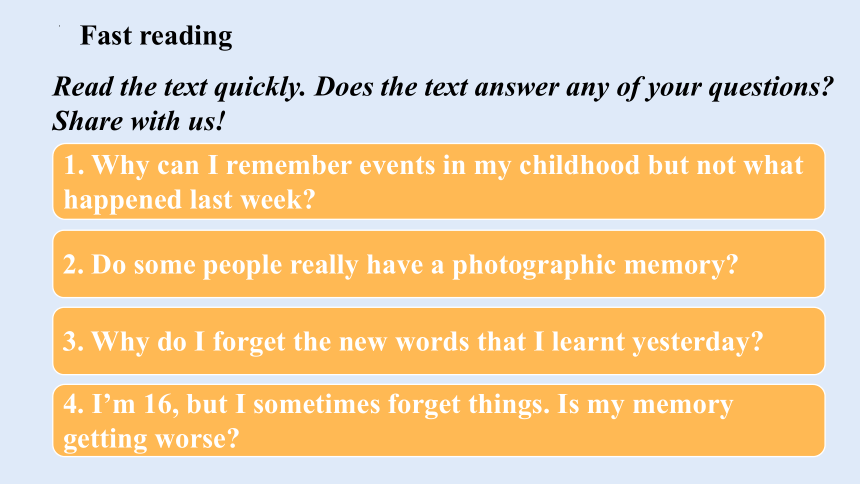
文档简介
(共25张PPT)
Unit 9 Learning
Lesson 3 The Secrets of Your Memory
目录页
contents
Pre-reading
I
Post-reading
IV
Fast Reading
II
Grammar
V
III
Intensive Reading
Ⅵ
Homework
Pre-reading
Ⅰ
Pre-reading: Memory games
Let’s play.
How good is your memory
Now, recall the numbers
37654
0401473
486854332
85129619450
918546942937
Look at the numbers for 5 seconds and then recall them!
Pre-reading: Memory games
Pre-reading: Activate and share
Which of the following things do you find easy to remember Why
names and faces
facts and arrangements
stories
things that happened long ago
things that happened recently
numbers: telephone numbers, passwords...
Do you have difficulty with memory If you were going to meet a memory expert, what questions would you ask him / her
Work in pairs, note down 1 or 2 questions you’d like to ask.
Pre-reading: Group work
Example:
Is there any special food that helps memory
Ⅱ
Fast Reading
Fast reading
Read the text quickly. Does the text answer any of your questions Share with us!
1. Why can I remember events in my childhood but not what happened last week
2. Do some people really have a photographic memory
3. Why do I forget the new words that I learnt yesterday
4. I’m 16, but I sometimes forget things. Is my memory getting worse
Fast reading: True or False and correct the false statements.
1 We remember certain events in our childhood, because we experienced many of them for the first time, and we felt strongly about them at the time.
( )
( )
( )
( )
( )
( )
2 When we tell a story many times, we forget important details.
3 Stephen Wiltshire has a photographic memory because he can draw a detailed picture of a city from memory after flying over it.
4 It has been proved that some people have a photographic memory.
5 The sharpest loss of memory occurs during the first five days.
6 Our memory starts to get worse in middle age.
F
F
F
F
F
T
We can remember them clearly.
He is good at remembering particular things but does not have a photographic memory.
No one has been proved to have a photographic memory.
The sharpest loss of memory occurs during the very early period after learning.
Our memory starts to get worse after the age of 25.
Ⅲ
Intensive Reading
Intensive reading
Question 1
Question 2
Question 3
Question 4
Suggestion A
Suggestion B
Suggestion C
Suggestion D
Connect it to our emotions
Spaced review
At a good age
Focus and be curious
Match the expert’s 4 suggestions with the four questions.
Intensive reading
Find out the truths and advice that Jemima Gryaznov gives about memory.
Question 1
Truth
We remember things that have strong connections in our mind, especially emotional connections.
Advice
We need to make strong connections with things we want to remember in our mind, especially emotional connections.
Intensive reading
Question 2
Truth
Nobody has a photographic memory.
Advice
We need to focus on the important ideas and be curious about what we learn when memorising complex learning materials.
Intensive reading
Question 3
Truth
The sharpest loss of memory occurs during the very early period after learning.
Advice
We need to review the information at regular intervals, especially in the first day after learning it.
Intensive reading
Question 4
Truth
Our memory reaches its full power at the age of 25.
Advice
We need to train our memory to remember more when we’re older.
Post-reading
Ⅳ
Post-reading: Summary
Post-reading: Group work
How has the expert tried to make her statements to each question convincing What methods has she used and what signal words can you find
To make her statements convincing the expert used:
examples: For example …
figures: a famous forgetting curve
quote: According to …
numbers: 25, 200, 40
Post-reading
Think about more ways to improve our memory.
Ⅴ
Grammar
Teacher: Ok, everyone. Let’s discuss something that many of you find difficult —1 ___________ new words. Does anyone have any 2 __________ advice on the best way to do this
Student 1: I think it’s good to try and organize new words by 3 _______. So, for example, if I have words related to “school”, I can write a 4 ________ list of all the vocabulary I can think of under that heading.
Student 2: That’s a good idea but even if I write lists, I still forget so many words. I think I just have a bad 5 _________.
memory significantly effective particular theme
materials focus therefore detailed memorising
memorising
particular
theme
detailed
memory
Focus on Language: Important words and phrases
Student 3: Well, when you learn new words in your coursebook it’s also useful to try and find them in other English language 6 ________. Read online articles or English literature and keep an eye out for the new words.
Student 4: That’s good advice but I wouldn’t 7 _______ too much on simply reading words. When you learn a new word, use it in spoken English. It 8 ___________ improves your ability to remember words if you’ve already used them in a conversation. 9 ___________, you must develop your speaking skills.
Teacher: Good ideas, everyone. I agree that speaking is the most 10 ________ way of remembering new words and phrases but everyone is different, so find the approach that works best for you.
materials
focus
significantly
Therefore
effective
Focus on Language: Important words and phrases
VI
Homework
Homework
Read the tips on Page 61 for improving your memory. Which tips seem most / least useful Which, if any, would be useful for English learning
Unit 9 Learning
Lesson 3 The Secrets of Your Memory
目录页
contents
Pre-reading
I
Post-reading
IV
Fast Reading
II
Grammar
V
III
Intensive Reading
Ⅵ
Homework
Pre-reading
Ⅰ
Pre-reading: Memory games
Let’s play.
How good is your memory
Now, recall the numbers
37654
0401473
486854332
85129619450
918546942937
Look at the numbers for 5 seconds and then recall them!
Pre-reading: Memory games
Pre-reading: Activate and share
Which of the following things do you find easy to remember Why
names and faces
facts and arrangements
stories
things that happened long ago
things that happened recently
numbers: telephone numbers, passwords...
Do you have difficulty with memory If you were going to meet a memory expert, what questions would you ask him / her
Work in pairs, note down 1 or 2 questions you’d like to ask.
Pre-reading: Group work
Example:
Is there any special food that helps memory
Ⅱ
Fast Reading
Fast reading
Read the text quickly. Does the text answer any of your questions Share with us!
1. Why can I remember events in my childhood but not what happened last week
2. Do some people really have a photographic memory
3. Why do I forget the new words that I learnt yesterday
4. I’m 16, but I sometimes forget things. Is my memory getting worse
Fast reading: True or False and correct the false statements.
1 We remember certain events in our childhood, because we experienced many of them for the first time, and we felt strongly about them at the time.
( )
( )
( )
( )
( )
( )
2 When we tell a story many times, we forget important details.
3 Stephen Wiltshire has a photographic memory because he can draw a detailed picture of a city from memory after flying over it.
4 It has been proved that some people have a photographic memory.
5 The sharpest loss of memory occurs during the first five days.
6 Our memory starts to get worse in middle age.
F
F
F
F
F
T
We can remember them clearly.
He is good at remembering particular things but does not have a photographic memory.
No one has been proved to have a photographic memory.
The sharpest loss of memory occurs during the very early period after learning.
Our memory starts to get worse after the age of 25.
Ⅲ
Intensive Reading
Intensive reading
Question 1
Question 2
Question 3
Question 4
Suggestion A
Suggestion B
Suggestion C
Suggestion D
Connect it to our emotions
Spaced review
At a good age
Focus and be curious
Match the expert’s 4 suggestions with the four questions.
Intensive reading
Find out the truths and advice that Jemima Gryaznov gives about memory.
Question 1
Truth
We remember things that have strong connections in our mind, especially emotional connections.
Advice
We need to make strong connections with things we want to remember in our mind, especially emotional connections.
Intensive reading
Question 2
Truth
Nobody has a photographic memory.
Advice
We need to focus on the important ideas and be curious about what we learn when memorising complex learning materials.
Intensive reading
Question 3
Truth
The sharpest loss of memory occurs during the very early period after learning.
Advice
We need to review the information at regular intervals, especially in the first day after learning it.
Intensive reading
Question 4
Truth
Our memory reaches its full power at the age of 25.
Advice
We need to train our memory to remember more when we’re older.
Post-reading
Ⅳ
Post-reading: Summary
Post-reading: Group work
How has the expert tried to make her statements to each question convincing What methods has she used and what signal words can you find
To make her statements convincing the expert used:
examples: For example …
figures: a famous forgetting curve
quote: According to …
numbers: 25, 200, 40
Post-reading
Think about more ways to improve our memory.
Ⅴ
Grammar
Teacher: Ok, everyone. Let’s discuss something that many of you find difficult —1 ___________ new words. Does anyone have any 2 __________ advice on the best way to do this
Student 1: I think it’s good to try and organize new words by 3 _______. So, for example, if I have words related to “school”, I can write a 4 ________ list of all the vocabulary I can think of under that heading.
Student 2: That’s a good idea but even if I write lists, I still forget so many words. I think I just have a bad 5 _________.
memory significantly effective particular theme
materials focus therefore detailed memorising
memorising
particular
theme
detailed
memory
Focus on Language: Important words and phrases
Student 3: Well, when you learn new words in your coursebook it’s also useful to try and find them in other English language 6 ________. Read online articles or English literature and keep an eye out for the new words.
Student 4: That’s good advice but I wouldn’t 7 _______ too much on simply reading words. When you learn a new word, use it in spoken English. It 8 ___________ improves your ability to remember words if you’ve already used them in a conversation. 9 ___________, you must develop your speaking skills.
Teacher: Good ideas, everyone. I agree that speaking is the most 10 ________ way of remembering new words and phrases but everyone is different, so find the approach that works best for you.
materials
focus
significantly
Therefore
effective
Focus on Language: Important words and phrases
VI
Homework
Homework
Read the tips on Page 61 for improving your memory. Which tips seem most / least useful Which, if any, would be useful for English learning
同课章节目录
- Unit 7 Art
- Lesson 1 Masterpieces
- Lesson 2 Beijing Opera
- Lesson 3 A Musical Genius
- Unit 8 Green living
- Lesson 1 Roots and Shoots
- Lesson 2 Greening the Desert
- Lesson 3 "White Bikes" on the Road
- Unit 9 Learning
- Lesson 1 Active Learning
- Lesson 2 Language Learning Tips
- Lesson 3 The Secrets of Your Memory
